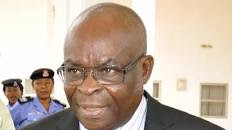
Opposition to the suspension of the Chief Justice of Nigeria (CJN), Justice Walter Onnoghen, continued, yesterday, as the United States (US), the European Union (EU), Lagos lawyer, Mr Femi Falana, SAN, and civil society groups, among others, criticised the action. The US described the suspension as questionable while the EU expressed concerns. President Muhammadu Buhari had, on Friday, announced the suspension of the CJN and moments later swore-in Justice Tanko Muhammad as Acting CJN.
The suspension climaxed the controversy over the allegations against Onnoghan that he failed to declare his assets and charges against him filed at the Code of Conduct Tribunal (CCT).
Suspended Chief Justice of Nigeria (CJN) Justice Walter Samuel Nkanu Onnoghen Buhari hinged his decision to suspend the CJN on a CCT order but the action immediately generated an uproar on the grounds that the President has no power to remove the CJN
without recourse to the Senate. Indeed, the US Embassy in Nigeria, in a statement, yesterday, said the decision of the executive arm of the government of Nigeria to suspend the head of another arm of government without the concurrence of the National Assembly was questionable.
It was the second time in three days that the US and the EU were issuing statements on Nigeria. Last Thursday, the US and the EU had threatened to place visa ban on any person who may attempt to manipulate Nigeria’s general elections holding in February and March.
A senior lawyer hinted that the CCT order in favour of the CJN’s ouster may have been obtained through the back door. In yesterday’s statement, the American government said the suspension of the CJN “undercuts the stated determination of government , candidates and political party leaders to ensure that the elections proceed in a way that is free, fair , transparent , and peaceful – leading to a credible result . The statement read , “
The Embassy of the United States is deeply concerned by the impact of the executive branch ’ s decision to suspend and replace the Chief Justice and head of the judicial branch without the support of the legislative branch on the eve of national and state elections . “
We note widespread Nigerian criticism that this decision is unconstitutional and that it undermines the independence of the judicial branch . That undercuts the stated determination of government , candidates , and political party leaders to ensure that the elections proceed in a way that is free , fair , transparent , and peaceful – leading to a credible result . “ We urge that the issues raised by this decision be resolved swiftly and peacefully in accordance with due process , full respect for the rule of law , and the spirit of the Constitution of Nigeria . Such action is needed urgently now to ensure that this decision does not cast a pall over the electoral process” .
Judicial process In its own reaction, the Election Observer Mission (EOM) of the European Union (EU) expressed concerns over the suspension of Onnoghen. The Mission, in a statement in Abuja, said it was concerned about the process and timing of the suspension of the CJN. It said that with 20 days to presidential and National Assembly elections, candidates and their political parties should be able to have confidence in the judicial process, a course that the suspension could not have enhanced.
The statement read, “The European Union was invited by the Independent National Electoral Commission to observe the 2019 general elections. “The EU Election Observation Mission (EU EOM) is very concerned about the process and timing of the suspension of the Chief Justice of Nigeria, Honourable Justice Walter Onnoghen, on 25 January. “With 20 days until the presidential and National Assembly elections, political parties, candidates and voters must be able to have confidence in the impartiality and independence of the judicial system.
OPRITEK



No comments:
Post a Comment
Please drop comments align to post
Thanks a trillion